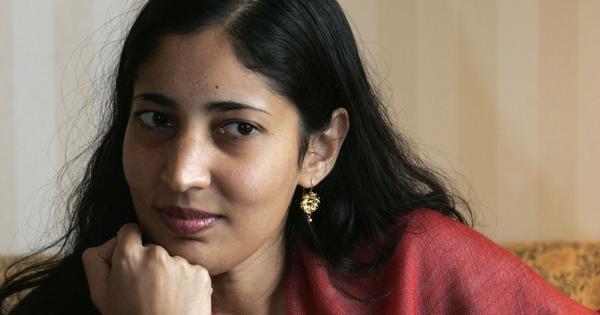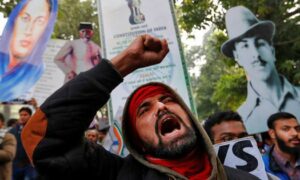
Glance through it too quickly, and The Loneliness of Sonia and Sunny might read like a rom-com destined for the airport bookshelf. The marketing even leans into this misdirection. What unfolds, however, is far richer and complex: an intimate portrait of families bound by strained ties; a story of two lovers navigating their relationship amid cultural expectations and past traumas; a meditation on power dynamics; and a nuanced exploration of immigration, race, and gender in the post-colonial world.
Desai’s return to fiction after an astonishing 19-year hiatus is nothing short of triumphant. Her 2006 Booker Prize-winning The Inheritance of Loss, a family saga set in the northeastern Himalayas, established her as a writer with incisive observation and wit. The Loneliness of Sonia and Sunny, out today, is already longlisted for the 2025 Booker Prize.
Loneliness and isolation
Though set in the 1990s and early 2000s, the novel feels startlingly contemporary. Its true subject is loneliness, and, for Desai, loneliness is never just emotional. It is political, cultural, systemic. It comes baked into the immigrant experience, surfacing as self-erasure and self-hatred.
This systemic loneliness manifests in the ways the characters navigate their lives. Sonia retreats into isolation as a graduate student in a small Vermont college town, where her most consequential tie is to an older, manipulative man. Meanwhile, Sunny tries to sand away his brownness in Brooklyn, tethering himself to his American girlfriend. Their choices mirror each other: both seek belonging through intimacy, yet the relationships they enter only sharpen their disconnection from themselves. What should be a salve instead becomes a wound, underscoring Desai’s argument that loneliness is not simply cured by proximity or romance – it deepens when one is forced to contort the self in pursuit of acceptance.
In India, loneliness wears a different guise: families and communities, assumed to be supportive, exist in strained relationships that allow isolation to fester. Sunny’s mother, Babita, now a widow, resides in her home, sandwiched between her late husband’s brothers and locked in ongoing disputes over objects and property. Though never physically alone, her solitude is shaped by the pressures of expectation. Her thoughts are consumed by her son, his success, and the desire to arrange his marriage.
And yet, Desai’s attention extends even further. She gives every character their own strains of isolation, layering the novel with perspectives that span well beyond the central pair. Sunny’s friend, urgently seeking a wife to bring back with him to the States, reflects the pervasive cultural expectation that marriage can stave off loneliness and that companionship is the remedy for life’s challenges. Fareeza, an unmarried Muslim friend of Sonia’s mother, experiences systemic loneliness. As a single woman from a religious minority, she must navigate pressures to appear compliant and grateful, suppressing her anger and desires. Her experience is a reminder that loneliness in Desai’s world is rarely merely emotional – it is embedded in the very structures of society.
Fragile longings
What prevents the novel from collapsing into despair is Desai’s extraordinary gift for empathy. The characters are layered, unpredictable, and alive with self-discovery. They may be selfish and standoffish, yet they are rarely irredeemable. Where family sagas often grow corrosive, leaving readers disenchanted or skewing toward a protagonist’s bias, Desai does the opposite: she draws us closer to each figure, and to the family as a whole, through their flaws. Reminiscent of the slow-burning character work in Rohinton Mistry’s A Fine Balance, Desai’s prose exposes fragile longings and vulnerable motivations. No character is incidental; even house staff, drivers, cooks, and distant friends are merited enough nuance to feel real, and none disappear after a passing mention. They return, over and over, infusing the plot with presence and life. We do not just read these lives, we inhabit them. And in inhabiting them, Desai invites us into a quiet philosophical inquiry about what it means to be a human in a fractured world.
The richness of these lives is made possible not just by Desai’s empathy, but by the care and precision of her prose. So commanding is her writing that, only a few weeks shy of finishing it, we are already itching to pick it up again – an absurd impulse, given its page count, but proof of how rewarding it is. We would give anything to be philosophising with Desai herself, and we suspect the rest of the world would, too.
Readers may begin by observing Sonia, Sunny, and their families, only to find themselves reflected: their own anxieties, their own yearning for acceptance, their own loneliness, or the daily negotiations of self versus community that shape every life. It is through this mirror that the novel resists framing Sonia and Sunny’s story as a conventional love story. We are not swept up in romance; instead, we root for their individual happiness and self-actualisation. The novel evokes the truth behind the saying that life is ultimately solitary: we come into this world alone, and we leave alone. But it does so without nihilism, celebrating the small acts of self-understanding and resilience that make life meaningful.
The Loneliness of Sonia and Sunny, Kiran Desai, Penguin Random House.
📰 Crime Today News is proudly sponsored by DRYFRUIT & CO – A Brand by eFabby Global LLC
Design & Developed by Yes Mom Hosting






